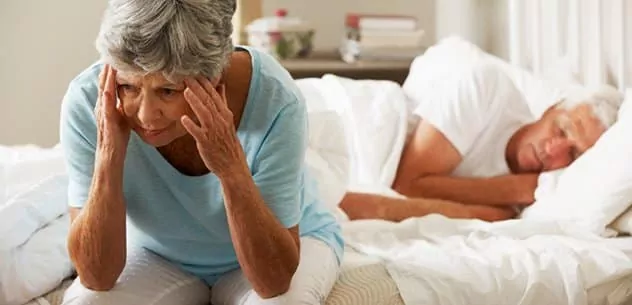I have a long and tortured history of sleeplessness. I lay awake for hours staring at the ceiling, tossing and turning. It’s been years since I’ve had a good night’s sleep, and my insomnia seems to be getting worse as I get older. I’ve tried going to bed early or staying up late hoping I’ll eventually crash. But seriously, why can’t I just fall asleep?
Does Aging Cause Insomnia?
You may experience insomnia more often as you age if:
You’re a woman.
Hormonal shifts in menopause may play a role. During menopause, night sweats and hot flashes can disrupt sleep.
You’re over age 60.
Because of changes in sleep patterns and health, insomnia increases with age.
You have a physical health condition.
Many issues that impact your physical health can interrupt sleep. Chronic pain from conditions such as arthritis or back problems, as well as depression or anxiety, can interfere with sleep. Issues that increase the need to urinate during the night ―such as prostate or bladder problems ― can disrupt sleep. Sleep apnea and restless legs syndrome become more common with age.
You have a mental health disorder.
Anxiety disorders, such as post-traumatic stress disorder, may disrupt your sleep. Awakening too early can be a sign of depression. Insomnia often occurs with other mental health disorders as well.
You take a lot of medication.
Older adults typically take more medication than younger ones which increases the chance of insomnia associated with the drugs.
You’re under stress.
Stressful times and events can cause temporary insomnia. And major or long-lasting stress can lead to chronic insomnia.
Your sleep patterns change.
Sleep often becomes less restful as you age, so noise or other changes in your environment are more likely to wake you. With age, your internal clock advances, so you may get tired earlier in the evening and wake up earlier in the morning. But older people generally still need the same amount of sleep as younger people do.
Your activity level changes.
You may be less physically or socially active. A lack of activity can interfere with a good night’s sleep. Also, the less active you are, the more likely you may be to take a daily nap, which can interfere with sleep at night.
Fortunately, there are lifestyle changes that you can make to help prevent insomnia.
Simple Changes in Your Daily Habits Can Help You Sleep Better
Try making these simple changes to help you sleep better on a regular basis.
Turn off electronics at least an hour before bed.
These devices emit a blue light that suppresses melatonin, a sleep-inducing hormone.
Stay ahead of hot, sweaty menopausal wakeups by using sheets and pajamas that wick moisture.
Sleeping on a buckwheat pillow, which is more cooling than traditional latex or down, can also help. 
Stay on a schedule.
Keep your bedtime and wake time consistent from day to day, including weekends.
Stay as active as possible.
Regular activity helps promote a good night’s sleep. Try to exercise early in the day as some people find exercising later keeps them up.
Check your medications.
Read up on the side effects to see if they may contribute to insomnia. If so, ask your doctor if it’s is possible to substitute another medication.
Avoid or limit naps.
Sleeping during the day can make falling asleep later more difficult.
Avoid or limit caffeine.
Some people don’t realize caffeine is found in chocolate, iced tea and soda, as well as coffee. Everyone metabolizes caffeine at a different rate, so stop at noon if you have difficulty sleeping.
Avoid or limit nicotine and alcohol.
Nicotine is another stimulant that can interfere with sleep. Alcohol may help you fall asleep, but prevents deeper stages of sleep and often causes awakening in the middle of the night.
Avoid large meals and beverages before bedtime.
A large meal can keep you up and drinking liquids before bed can cause you to wake up to go to the bathroom.
Make your bedroom comfortable for sleep and only use it for sex or sleep.
And if you read before bed, do so in another room.
Create a relaxing bedtime ritual.
Take a warm bath, read or listen to soft music.
If you are stressed, try to figure out and address the root cause.
Doing so will help you sleep better.
Try to have an accepting mindset. Lying in bed trying to force sleep to happen generally backfires and causes anxiety. If you acknowledge sleep will come when it comes, and if not that night, you’ll likely sleep better the next night. Don’t sleep in to compensate – try to stick to a schedule.
So, Does Aging Cause Insomnia?
The answer is yes. We are at higher risk of sleep disorders as we age due to changes in routine, medications, health status, etc.
Sleep can be so elusive. How much sleep is enough varies from person to person, but most adults need seven to eight hours a night. I am starting today to work on incorporating some of the above changes into my life. Some are easier said than done and so I plan to work on just one at a time. Setting realistic goals is important for me, otherwise I get frustrated and give up. I plan to tackle the one that will be hardest for me first; trying to have an accepting mindset. I tend to panic when I can’t sleep, which of course makes falling asleep that much harder.
Which do you need to work on? I would love to hear from you in the comment section below.










